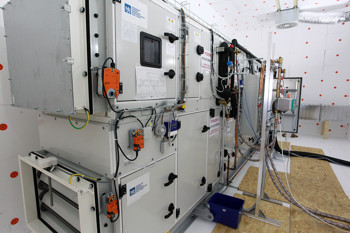Environmental Engineering
Tutor: doc. Ing. Vladimír Zmrhal, Ph.D.
![[zamereni_studia/budovy/budovy_01m.jpg]](https://fs.cvut.cz/content/images/zamereni_studia/budovy/budovy_01m.jpg) For the Environmental Engineering master's degree program, the Department of Environmental Engineering provides in-depth teaching of fluid mechanics, heat transfer
and mass transfer with a focus on applications in the field. In addition to the above theoretical topics, the main subjects
of the Department of Heating, Ventilation, Air Conditioning, Air Protection, Noise and Vibration Reduction, Heat Supply, Alternative
Energy Sources and Regulation. In these subjects, students acquire knowledge of construction, design and dimensioning of
machines and technical equipment in the field. The field of study also includes methods of measuring and evaluating the quality
of the environment (subject Experimental Methods) with a focus on indoor and outdoor air, the thermal state of the environment,
noise and vibration of machines. Experimental teaching also includes methods for determining the functional parameters of
environmental technology equipment.
For the Environmental Engineering master's degree program, the Department of Environmental Engineering provides in-depth teaching of fluid mechanics, heat transfer
and mass transfer with a focus on applications in the field. In addition to the above theoretical topics, the main subjects
of the Department of Heating, Ventilation, Air Conditioning, Air Protection, Noise and Vibration Reduction, Heat Supply, Alternative
Energy Sources and Regulation. In these subjects, students acquire knowledge of construction, design and dimensioning of
machines and technical equipment in the field. The field of study also includes methods of measuring and evaluating the quality
of the environment (subject Experimental Methods) with a focus on indoor and outdoor air, the thermal state of the environment,
noise and vibration of machines. Experimental teaching also includes methods for determining the functional parameters of
environmental technology equipment.
BASIC DIRECTIONS OF THE FIELD OF ENVIRONMENTAL ENGINEERING
 VENTILATION AND AIR CONDITIONING
VENTILATION AND AIR CONDITIONING
Students gain design and design knowledge of elements and systems for ensuring air purity and thermal comfort in residential and industrial buildings (apartments, hospitals, theaters, cinemas, shops, restaurants and manufacturing facilities, especially in mechanical engineering, energy, metallurgy, chemistry, agriculture, electrical engineering) . Air treatment (filtration, heating, cooling, humidification, dehumidification) is based on applications of thermomechanics and hydromechanics. Most devices operate in automatic mode. Qualification in the field also includes automatic regulation and cooling. Computer design and simulation methods are used in teaching and design work (calculations, drawings).
HEATING
The subject of teaching is methods of design of central heating, heat distribution and heat sources for heating, which today are mainly switched to noble fuels, as well as construction and design knowledge. A set of technical solutions is applied here: heat source (boiler, alternative energy source including heat recovery) - heat transfer medium distribution (water distribution hydraulics, hydraulic balancing…) - heat accumulation (design of heat storage tanks) - heating surfaces (radiators, floor, wall and ceiling heating surface) - regulation and measurement of heat consumption. The need to reduce energy consumption is significantly reflected in the field, both through better thermal-technical solutions of buildings and the application of modern heating systems, suitable design of heating surfaces and hydraulic parameters of heating systems, including regulation of thermal output.
ALTERNATIVE SOURCES OF ENERGY
Graduates will be able to design and evaluate the benefits of equipment using alternative energy sources, especially solar energy (solar thermal systems), environmental energy (heat pumps) and biomass energy. They can design individual elements for the use and conversion of energy (solar collectors, heat pumps), as well as complete energy systems and applications. Can evaluate economic and environmental benefits.
AIR PROTECTION
Teaching is focused on the construction and design of separators of solid and gaseous pollutants, measurement of emissions and immissions, evaluation of air pollution, legislation in air protection, the basics of dispersion of pollutants in the atmosphere. The teaching draws on the rich experience in the involvement of the institute in solving research and development projects and cooperation with industry on specific tasks in the field of air protection.
NOISE AND VIBRATION
Professional qualification in this area is an indispensable part of the education of technicians dealing with environmental protection as well as designers of air conditioning and heating equipment. It enables graduates to apply for the positions of constructors, designers and specialists in the operation of machinery. Graduates also apply to the hygienic service when approving projects in the municipal area. The subject of teaching is not only methods of reducing machine noise, methods of passive anti-noise measures (noise and vibration dampers), but also methods of evaluating machine noise and anti-noise measures. In the field of environmental care for mechanical engineers, the issue of noise is one of the most serious, as substantial production of noise (acoustic energy) comes from machinery.
![[design/2014/cvut-logo-en-white.png]](https://fs.cvut.cz/content/images/design/2014/cvut-logo-en-white.png)
![[design/2014/cvut-logo-en-print.jpg]](https://fs.cvut.cz/content/images/design/2014/cvut-logo-en-print.jpg)